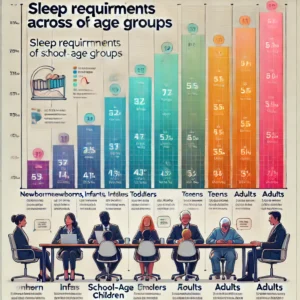A distinctive pattern unfolds each night across Saudi Arabia, a nation of over 35 million people. With a population that is approximately 57% male and 43% female, and a vibrant mix that includes around 38% expatriates, the Kingdom is also notably young – roughly 63% of its citizens are under 30. This demographic is particularly susceptible to the allure of late nights, making the Kingdom’s approach to sleep a topic of growing global interest. The night is a time for bustling gatherings, cafes that stay open until the early hours, and a social fabric that thrives well past midnight. This deeply ingrained culture of nocturnal activity, fueled by a sense of community and social obligation, stands in contrast with global health recommendations, placing Saudis among the populations with the least amount of sleep worldwide. This article delves into the heart of this contagious nightlife culture, explores its consequences, and highlights the positive changes that are beginning to emerge.
Why the Nightlife is Contagious: Unpacking Saudi Arabia’s Sleep Patterns
The prevalence of late nights in Saudi Arabia isn’t simply a matter of individual choice; it’s a complex interplay of environmental, social, and cultural factors that create a “contagious” effect, where late-night habits are easily adopted and reinforced within the community.
Climate and the Cool Embrace of Night
The extreme heat of the Saudi Arabian climate, especially during summer months when temperatures in cities like Riyadh can soar beyond 50°C, often compels people to defer outdoor activities until the sun sets. This hot weather in most of Saudi Arabia is a major factor in determining daily activities. While regions such as Abha and Taif experience milder temperatures, the capital’s nocturnal lifestyle has permeated the culture, influencing sleep patterns across the Kingdom. The night becomes a welcome escape from the oppressive heat, a time for activity and social interaction.
Image Suggestion: A panoramic view of Riyadh, showing the contrast between the heat of the day and the bustling nighttime life.
The Social Pressure to Stay Up Late
Saudi culture has a deeply ingrained emphasis on strong family ties and close-knit community relationships. These social connections are often the life

blood of daily life. Family gatherings, outings with friends, or visits to neighbors often extend late into the night, driven by a sense of social obligation and the desire not to miss out. According to the Saudi General Authority for Statistics, a significant 58% of Saudi households prioritize social time, usually occurring after dinner. This late-night socialization becomes contagious; the pressure to participate in these gatherings can easily override personal sleep needs, contributing to the widespread sleep deficit.
The Digital Embrace: Technology’s Role in the Nocturnal Lifestyle
Saudi Arabia boasts impressive internet penetration rates, with over 92% of the population online as of 2021. This widespread access, coupled with nearly ubiquitous smartphone use, fuels a significant engagement with social media platforms such as Twitter, Instagram, TikTok, and Snapchat. Many Saudis spend hours online, engaging in digital content, often connecting with their social circles virtually, further extending their waking hours. This digital engagement, while offering a wide array of connections and entertainment, also plays a significant role in perpetuating the contagious late-night culture.
Key Statistics and Facts
The following statistics highlight the concerning nature of sleep patterns in Saudi Arabia:
- According to a 2019 Sleep Cycle survey, Saudi Arabia ranked third globally, after South Korea and Japan, for the least amount of sleep, with an average of just 6.5 hours per night—significantly less than the recommended 7-8 hours.
- Notably, recent studies have indicated that the average bedtime for Saudis is around 2:00 AM, with many pushing past 3:00 AM on weekends. This late sleep schedule contributes to a significant reduction in sleep duration.
- A report fr
 om the National Center for Mental Health Promotion in Saudi Arabia highlights that 34% of Saudis experience sleep disorders, with a large portion of these issues stemming from late-night activities.
om the National Center for Mental Health Promotion in Saudi Arabia highlights that 34% of Saudis experience sleep disorders, with a large portion of these issues stemming from late-night activities. - A survey by the Saudi Sleep Society revealed that 70% of Saudis go to bed after midnight, with the percentage rising to 82% among the youth population.
- Moreover, data from various he
- alth authorities within the Kingdom show that almost 60% of Saudis report feeling tired or fatigued during the day, directly linked to poor sleep habits.
- Furthermore, a study by the Saudi National Sleep Registry revealed that only about 20% of Saudis obtain the recommended 7-8 hours of sleep on a regular basis.
The Hidden Cost: Health Impacts of Prolonged Sleep Deprivation
Sleep is not just a luxury—it’s essential for maintaining good health. Research from the Saudi Health Authority indicates that sleep deprivation can lead to various health issues. Chronic sleep deprivation is linked to an increased risk of obesity (by 27%), diabetes (by 35%), and higher rates of anxiety and depression. The physical toll of prolonged sleep loss is apparent in the high incidence of lifestyle diseases and mental health challenges in the country.
Breaking the Cycle: Saudis Embracing Balanced Lifestyles
Despite the allure of late nights, and the contagious nature of the nightlife culture, there is growing awareness in Saudi Arabia about the importance of a balanced lifestyle. Saudis are taking active steps to improve their sleep patterns and overall health, moving towards breaking free from the cycle of late-night habits:
Conscious Time Management
Many Saudis are now using digital tools and apps to organize their schedules, consciously balancing their social activities with the essential need for rest. This proactive time management has led to a rise in better sleep hygiene and more structured daily routines, demonstrating a commitment to breaking the contagious pattern of late nights.
Increased Participation in Community Wellness and Activities
The Saudi government’s focus on promoting sports and healthy living has been a driving force in encouraging people to adopt active lifestyles. Participation in marathons, local football leagues, and community hiking groups has surged. This active lifestyle not only fosters better physical health but also supports more balanced sleep patterns, helping individuals resist the contagious pull of late-night activities.
A Future of Balance: Saudis Redefining Sleep Habits
While the contagious nightlife culture remains pervasive in Saudi society, there is a growing movement toward healthier living and a realization that sleep is not something to be sacrificed for the sake of social interaction. As more people become aware of the negative impact of sleep deprivation, many are making efforts to prioritize their health, adopting balanced routines and engaging in activities that promote physical and mental well-being. The future of sleep in Saudi Arabia may well lie in finding a harmonious balance between social connections, technology, and health, effectively breaking the contagious cycle of late-night habits.
The cultural shift toward healthier habits is evident in the growing emphasis on wellness, fitness, and mental health in the Kingdom. As more Saudis continue to appreciate the benefits of sleep, the late-night culture is likely to evolve further, paving the way for a more balanced and health-conscious society, effectively mitigating the contagious influence of late nights.




























